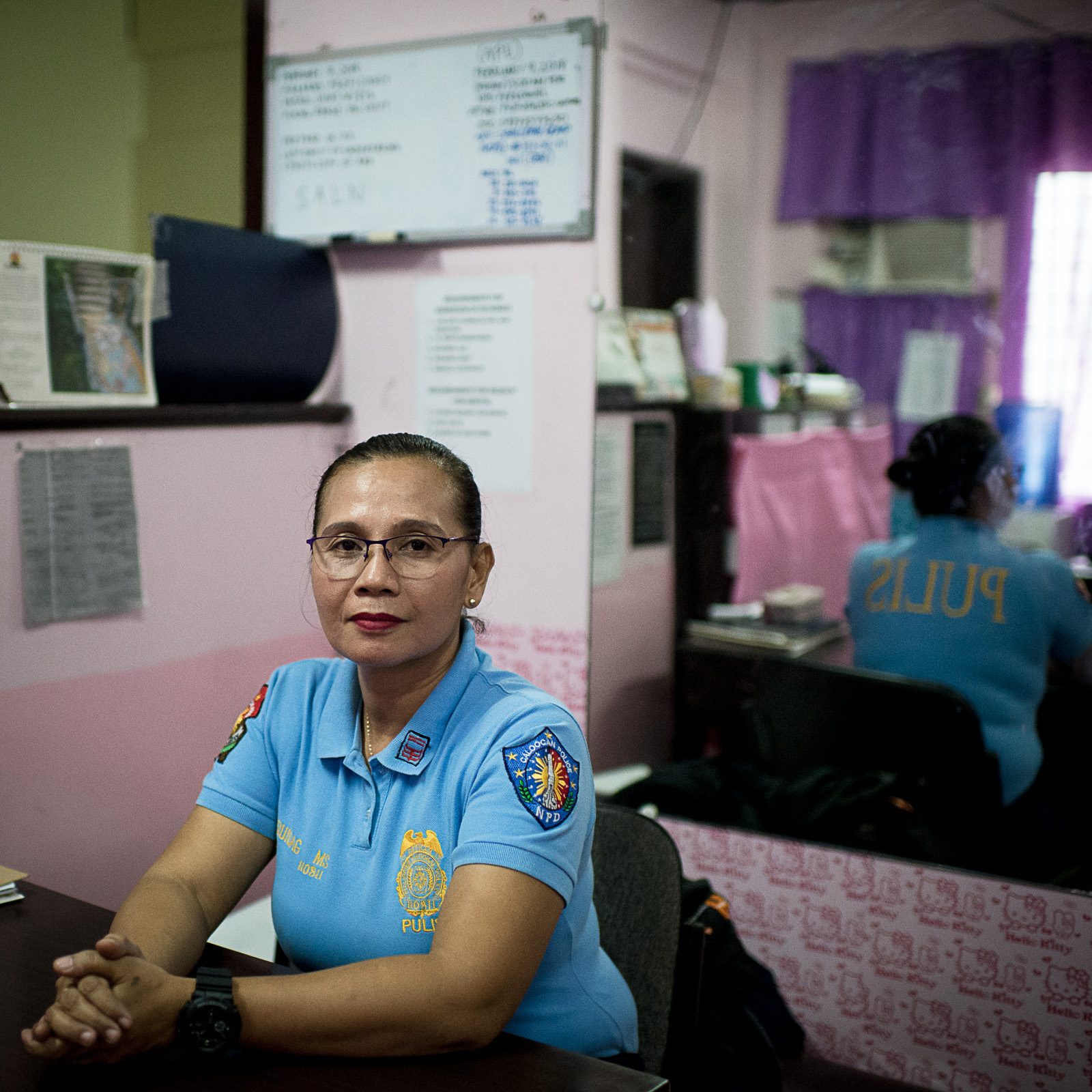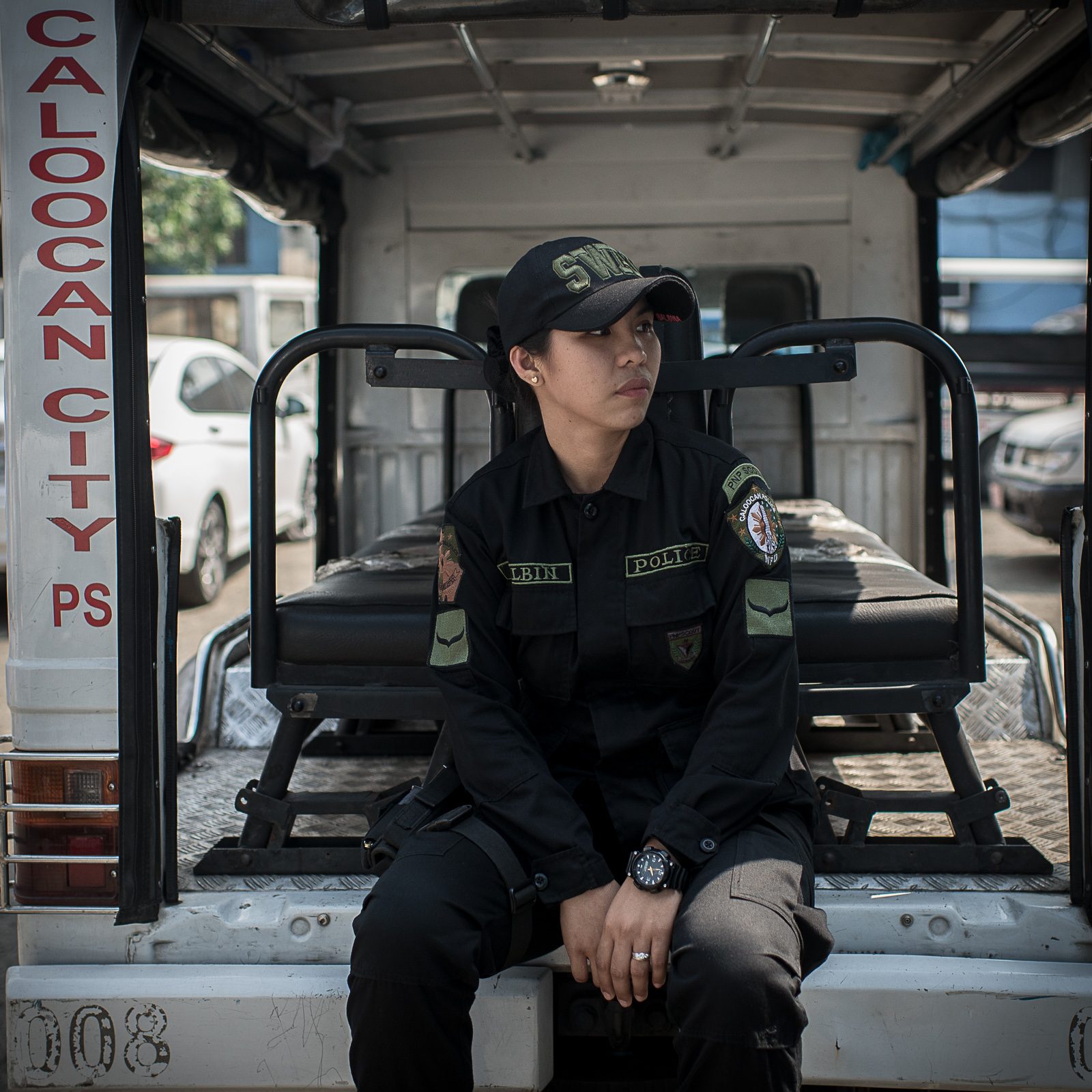SUMMARY
This is AI generated summarization, which may have errors. For context, always refer to the full article.

MANILA, Philippines – When Flordeliza Matias applied for her first job at the Philippine National Police (PNP), she had to wait for a whole year before she could start working.
In the PNP, female applicants are only alotted 10% of new positions, leaving many aspiring female cops waiting for months, even years to take their oath.
Once they’ve managed to break the barrier, the next challenge is to be sent to the field as most policewomen are assigned to do administrative work.
Fortunately for Matias, she did not have to go this route.
Currently on beat patrol, Matias is stationed near a shopping mall in Caloocan City after the local government requested for supervision following a series of carnapping incidents.
Caloocan police
Matias is among the hundreds of cops transferred to the Caloocan Police District in 2017, after Caloocan City cops were forced to undergo retraining and reorientation. This was after the string of killings of teenagers alleged against the city cops.
Caloocan City Police District Commander Jemar Mondequillo has 1,256 cops under him – both new and reinstated. Only 141 of them are female.
Mondequillo said this has always been the ratio of males and females in the police force because the needs of the PNP are intrinsically male.
Females are only hired based on the “necessities” of a specific police station, which often means they need more people to do administrative work.
“Wala ‘man lalaki o babae dito kasi we belong to one service, one organization (There’s no man or woman here because we belong to one service, one organization),” Mondequillo said.
“Ang presumption dito anything that can be done by lalaki, can also be done by babae (The presumption here is that anything a man can do, a woman can as well),” he added.
Still, Mondequillo said most of the assignments given to the women “yung pambabae talaga, na administrative work (are women-oriented, administrative work).”
Fortunately for fresh graduates and Police Officers 1 (PO1s), the guidance of the PNP is to let them experience the field.
This is perhaps why Matias is lucky to be enjoying her current daily grind, responding to petty crimes and community brawls.
“Nagpulis kasi talaga ako kasi gusto ko y’ung thrill, at madami kang makakasalamuha na tao (I became a cop because I want the thrill, and I meet a lot of people),” Matias said.
Administrative work
But not all policewomen are like Matias. Others like Senior Police Officer 3 (SPO3) Marikaye Daquioag prefers administrative work.
In her 20 years in service, Daquioag has served majority of her years in the office– delegating tasks, preparing documents, and responding to walk-in complainants.
In 2009, she was assigned as chief clerk of the Women’s Desk in Caloocan Police Station, during which she experienced some of the most unforgettable instances in her career, helping women recover from domestic violence and abuses.
“Sa administrative side, madami kang nagagawa in behalf of mga kasamahan mo (In the administrative side, you can do a lot of things on behalf of other people),” Daquiaog said.
Her work in the Women’s Desk also inspired her daughter to become a policewoman.
“Noong college siya, nakikita niya ‘yung cases of domestic violence dito sa Women’s Desk. Tuwing meron kaming walk-in clients, mabigyan mo lang sila ng immediate assistance – i-comfort mo lang sila, bigyan mo sila ng ideas—malaking tulong ‘yon. Na-motivate ‘yung anak ko,” she said.
(When she was a college student, she saw the domestic violence cases handled by the women’s desk. Everytime we have walk-in clients, your immediate assistance, your comfort, even the ideas you give them, that’s already a big help. It motivated my daughter.)
“Sabi niya sa akin, ganoon pala, marami kang natutulungan, akala ko, puro chika-chika ka lang (She told me, you really help a lot of people, I thought it just involved chatting),’” Daquioag said of her daughter who is now working in the intelligence group at Camp Crame.
Daquioag is currently under the Mobile Patrol Unit – the only woman in the 48-strong group.

Motherhood
At 48, Daquioag rarely has any problems balancing her work as a cop and a mother to two children, 19 and 24.
For many mothers in the PNP, this is one of their biggest challenges.
Matias, for one, is mother to two children, ages 7 and two. When she gave birth to her second child, she said she had to leave her not long after birth because maternity leave is only two months.
Babysitting is neither an option for her and her husband as both of them are police officers. Her husband stationed in Bulacan City.
They both only get one day off work which they spend in Nueva Ecija, where their children live with Matias’ parents-in-law. The off-chance she sees her husband is only when they coincidently get the same days off.
“Kahit gustong-gusto mo nang umuwi, wala ka magagawa. Iba kasi sa lalaki, kaya nila. Kapag nanay ka, mas mahirap sa ’yo iwan ang anak mo (Even though you badly want to go home, you can’t do anything. It’s different for men, they can handle it. If you’re a mother, it’s harder for you to leave your child),” Matias said.
This is the same reason why Mondequillo thinks motherhood is a “disadvantage” to female cops.
“Masigasig sila sa trabaho pero meron din disadvantages na nakikita natin, tulad ng motherhood nila. Mas marami ang paalam ng babae sa lalaki. So, kung ako ang tanungin mo, I will not be unfair sa mga babae pero I usually prefer boys,” Mondequillo said.
(They are really hardworking but there are also disadvantages, like motherhood. Women ask for more leaves than men. So if you ask me, I will not be unfair to women but I usually prefer boys.)
Often, Mondequillo said he would get requests from policewomen to get days off due to “that time of the month,” pregnancy, kids’ birthdays, graduations, and other occasions that has ultimately made him biased for males.
“Pangkalahatan na ‘yung lalaki kasi. Nahahati ang atensyon [ng babae], hindi pareho sa lalaki. Ang lalaki kayang iwanan ang pamilya,” Mondequillo said.
(Men are all-around, while women divide their attention, unlike men. Men can leave their families.)
Mondequillo added that many policewomen are also single mothers.
Not ladies first
As mothers, the safety of policewomen are often prioritized more than policemen.
For PO1 Jaynalyn Ann Balbin, this has been both a blessing and a curse.
Previously with the NCRPO-Regional Safety Battalion, Balbin has served as security to former President Benigno Aquino III in his Quezon City home, and as marshall during the papal visit in 2015.
After being transferred to Caloocan last year, she is now assigned to the Special Reaction Unit, which does regular patrolling and “one-time, big-time” anti-criminality operations in the city.

Often, Balbin’s job is to communicate with the community because residents are often more comfortable and at ease with women.
But she doesn’t get assigned to operations all the time.
“Minsan may pagkakataon na hindi ka nila pwedeng isama kasi babae ka – tingin sa ‘yo casualty ka (There are times they don’t bring you with them because you’re a woman, they look at you as casualty),” Balbin said.
Mondequillo said women are only assigned to an operation when the subject is also female or when they are needed to talk to the mother or the children of the suspect or the arrested. In “risky” operations, including tokhang and buy-bust operations, women are left out. (READ: Suspended Caloocan police set to return)
“In any operations the PNP does, back up lang ‘yung babae. Una palagi ‘yung kalalakihan (women are always for back up, men are always on the front line),” Mondequillo said.
“Ganoon talaga ‘yung proseso dahil pine-preserve din natin ang buhay nila. Kung mamatay lahat ng lalaki doon, doon na sila [mga babae],” Mondequillo said.
(That’s really the process because we are preserving their life. If all men die, women come in.)
For the same reason, Balbin was not able to apply for her initial preferred assignment – the Special Weapons and Tactics personnel or SWAT.
A few years ago, she had hoped to be part of the SWAT team in the National Capital Region Police Office but was told that only SPO3’s or higher-ranked police are allowed in the course.
Recently however, she was told that only males are allowed in the team.
“May nakita ako sa Facebook na nagiisang babaeng gumraduate sa SWAT course recently, nakaka-boost [ng morale], kaso dito lalaki muna ang priority nila,” Balbin said.
(I saw on Facebook that there was a woman, the only woman, who graduated from the SWAT course recently. It boosts morale, but here, men are their priority.)
Currently, only 16 of the police station’s 52 SWAT personnel are female.
Mondequillo said that this protocol is not about gender bias but rather, being particular about each one’s specific skills.
“Ang tinitingnan natin dito is putting the right person to the right job. It all lies in their dedication. Minsan nga mas aggressive pa ang babae, o mas sincere sa trabaho,” Mondequillo said.
(What we’re looking at here is putting the right person in the right job. It all lies in their dedication. Sometimes women are more aggressive than men, or more sincere in their work.)
He added that the PNP has been putting extra effort into hiring non-uniformed personnel to assign to clerical work such as being a registrar, or encoder.
The problem with this is non-uniformed personnel would not be amenable to work overtime, unlike police officers.
“Pagkatapos ng 9 to 5, sinong gagawa ng trabaho? Police pa rin (After 9 to 5, who will do the work? It will still be the cops),” Mondequillo said. – Rappler.com
Add a comment
How does this make you feel?
There are no comments yet. Add your comment to start the conversation.